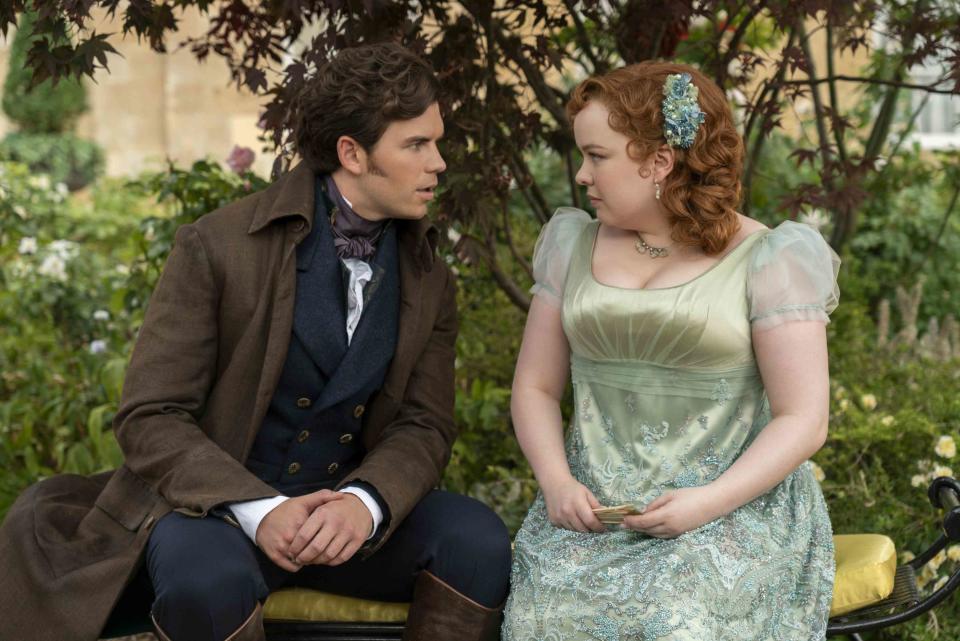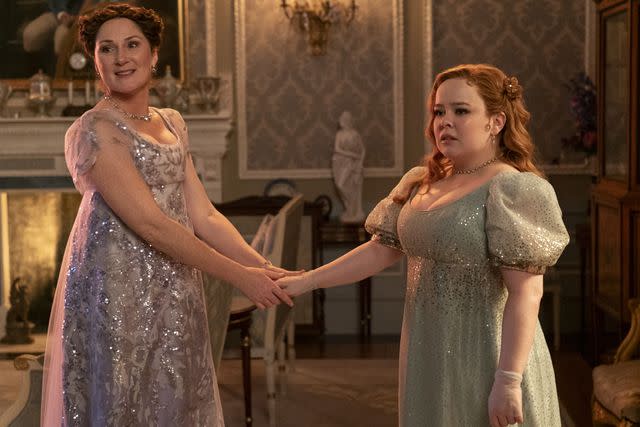Penelope's 'Bridgerton' Arc Confronts the Myth of Having It All
It's so much more than a love story.

Netflix
Season 3 of Bridgerton follows the slow-burning romance between Penelope Featherington and Colin Bridgerton as it comes to a head. And after two seasons of pining, it's a relief to find that their relationship is established with little complication. (A carriage make-out set to instrumental Pitbull does the trick.)
The season's real story develops not from the will-they-won't-they tension of previous seasons but from Penelope’s secret identity as Lady Whistledown, which takes on new weight as she prepares to become Mrs. Bridgerton. Through blackmail, ultimatum, and royal decree, Penelope is asked to choose between the man she loves and the name she’s made for herself, a dilemma that proves to be the series most timeless.

Courtesy of Netflix
Part two of Bridgerton Season 3 begins with Colin and Penelope basking in his family’s congratulations. But their post-betrothal bliss is soon overshadowed by her secret. Wanting to save Colin from heartbreak, Eloise insists Penelope come clean just as Queen Charlotte and Cressida Cowper get closer to the true identity of Lady Whistleton. Motivations for revealing Penelope's alter ego vary, but the whole ton seems to agree that the mysterious author of a gossip sheet would make for an unfit wife.
When Penelope's mother, Portia Featherington, offers her some marriage advice, urging her to cater entirely to Colin's wishes, Penelope pushes back, asking where her own dreams factor in. The matriarch doubles down, explaining that “Ladies do not have dreams. They have husbands.” Even Eloise, the show’s most staunch feminist, asks Pen to choose between her writing and a future as Colin's wife, asking her to let Cressida Cowper take credit for Lady Whistledown and put down her quill. Thankfully, Penelope resists, saying that Whistledown is her name and hers alone. “Your name is about to be Bridgerton," Eloise says. "You cannot be both.”
Wallflower or not, Penelope asks for more than any Bridgerton woman ever has: To be a wife, yes, but also to have a voice, run a business, and make her own money. Penelope refuses to choose between the occupation she's carved out for herself and the life she's dreamt of with Colin. In the end, it's out of her hands because Colin discovers her secret on his own.
At first, her future husband is angry. He's been lied to and publicly embarrassed by the person he loves most. And he can't square his understanding of Penelope—who's loyal, reserved, and largely overlooked—with that of Lady Whistledown, who's independent, outspoken, and a frequent subject of the ton's attention.
In one scene, after Cressida tries to blackmail Penelope, Colin tries to play knight in shining armor. He dismisses Pen's input, insisting his family will pay the ransom, until she quietly chimes in, explaining she's earned enough money from Whistledown to pay it herself. You can see the balance shift. In most marriages of the ton, wives are ten years their husband's junior and entirely dependent on them for survival.
In the end, Colin has to contend with a very different partnership than his peers if he wants to marry Penelope. She brings money, fame, and, potentially, a title for their child into the marriage. Not to mention, he is an aspiring writer, while his future wife is already an established one. He has to wrestle with his identity as a provider and protector, asking what good he is if Penelope can care for herself. Ultimately, he comes around, standing by her side as she begins publishing under her own name.
Penelope ends the season married to the love of her life, mother to a baby boy, and author of a successful column. She has it all, even by modern standards. But it’s easy to see how it could have gone differently. Had she chosen another, less open-minded suitor, she could've lost everything. We see examples of this outcome all over the ton: Cressida Cowper nearly ends up with a man who denies her music, gossip, and time with friends. Kate Bridgerton, though happily married, leaves behind the life of independence she'd planned for herself by marrying Anthony Bridgerton. Even Lady Danbury still mourns her loss of freedom decades after her husband is gone.
In Regency England, women are allowed to dream of little more than marriage and motherhood. But somehow, Penelope secures a different future and chooses a husband who sees her as more than an extension of himself.
So much of the Bridgerton universe is specific to the Regency era. Its courtship rituals, from dance cards to duels, feel distant. Today, women can own property and move freely without a chaperone. We don't risk ruin with every rendezvous. But the tension Penelope faces between love and ambition is just as relevant today as it was 200 years ago. Women can have it all without a partner. But those who do want marriage, motherhood, and a career may still find that who they choose to pair up with limits their chances of achieving all three.
Portia's "Ladies do not have dreams" speech may have sounded dated—she tells Penelope that at best, "If you are lucky and you fulfill your role, sometimes what you wish for may come true... through [your husband]." But in reality, women are still hearing that advice today. Just take the recent (viral) graduation address by NFL player (and teammate of Travis Kelce) Harrison Butker.
Addressing the female students in the audience, he said, "Some of you may go on to lead successful careers in the world, but I would venture to guess that the majority of you are most excited about your marriage and the children you will bring into this world. I can tell you that my beautiful wife, Isabelle, would be the first to say that her life truly started when she began living her vocation as a wife and as a mother." Historical context aside, both speeches suggest whatever dreams a woman has come secondary to her primary role as wife and mother.
Watching both, I remembered a career seminar I sat through in college. Asked for her best career advice, the speaker told the room full of women, "If you get married, choose carefully." Consider how much easier it is to balance kids and a career with a partner who's willing to leave work, pick up a sick kid, or move for a job—really, any of the responsibilities women are expected to shoulder regardless of the support given from their husbands. Having it all, she seemed to suggest, required choosing the right partner. This season, Polin made the case that she's right.
Bridgerton has always had a feminist streak. Daphne spoke freely about the unique pressures women face, while Kate challenged conceptions of what a lady could look like while riding, hunting, and providing for her family. But in prior seasons, marriage remained the ultimate prize. This time around, Penelope got the guy early on, but marriage was not the apex of her ambitions. She wanted more for herself, and the right guy stood by her until she got it.
The classic friends-to-lovers storyline got added depth from a leading lady whose desires weren't so easily categorized, and her happily ever after was all the more satisfying for it.
For more InStyle news, make sure to sign up for our newsletter!
Read the original article on InStyle.

 Yahoo News
Yahoo News 
